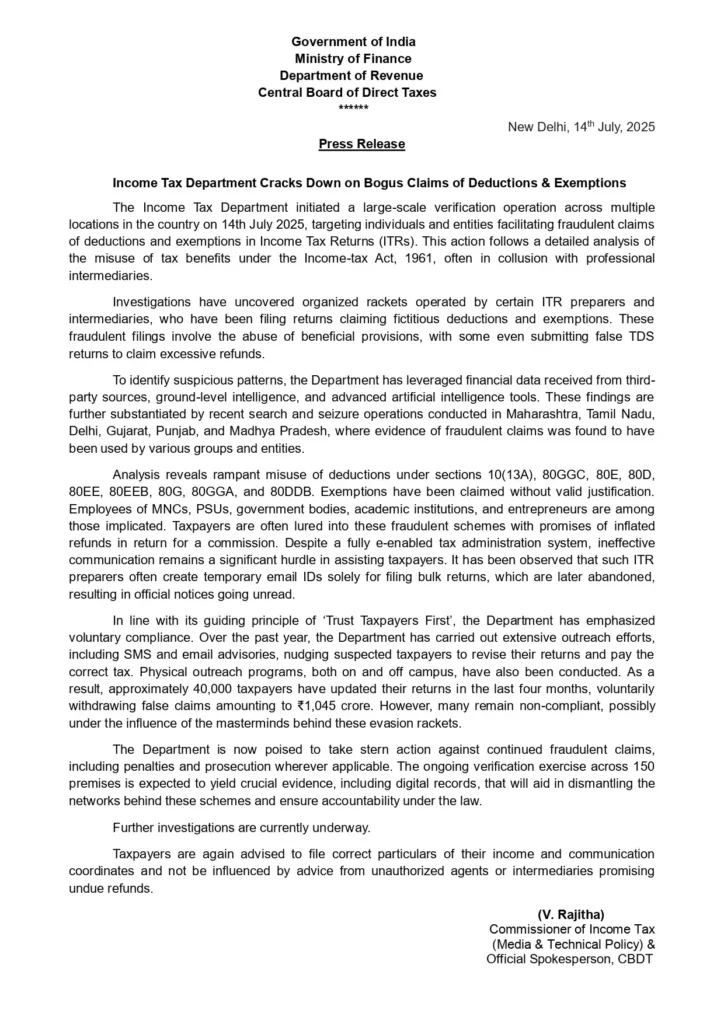The Indian Income Tax Department has just announced a massive nationwide operation targeting fraudulent tax deductions and exemptions. This crackdown, launched on July 14, 2025, represents one of the most comprehensive efforts to tackle tax evasion in recent years.
Think of this operation like a nationwide audit using advanced technology. The Income Tax Department discovered that organized groups of tax preparers and intermediaries have been helping people file false claims to get bigger tax refunds. These fraudulent schemes work by claiming deductions and exemptions that taxpayers aren’t actually entitled to.
The department used artificial intelligence tools and data from third-party sources to identify suspicious patterns across the country. Imagine it as a sophisticated detective system that can spot when something doesn’t add up in tax returns filed from different locations.
Which Tax Benefits Are Being Misused?
The crackdown focuses on several popular tax deductions that many honest taxpayers use legitimately. These include House Rent Allowance claims under section 10(13A), education loan interest under 80E, medical insurance premiums under 80D, and various other deductions like 80EE, 80EEB, 80G, 80GGA, and 80DDB.

To understand how this fraud works, consider this example: A tax preparer might claim you paid house rent of ₹50,000 per month when you actually live in your own home. This false claim could reduce your tax liability significantly, but it’s completely illegal.
The Scale of the Problem
The investigation revealed that these fraudulent activities have been happening across multiple states, including Maharashtra, Tamil Nadu, Delhi, Gujarat, Punjab, and Madhya Pradesh. The department found that some tax preparers were creating temporary email addresses just to file bulk returns and then abandoning them, making it difficult to track down the perpetrators.
What’s particularly concerning is that employees of multinational companies, public sector units, government bodies, academic institutions, and entrepreneurs have all been targeted by these schemes. The fraudsters often promise inflated refunds in exchange for a commission.
What the Government Has Done So Far
The good news is that the department has been working on this problem for over a year. They’ve sent SMS and email advisories to suspected taxpayers, encouraging them to correct their returns voluntarily. Physical outreach programs have also been conducted both on and off campus.
As a result of these efforts, approximately 40,000 taxpayers have already updated their returns in the past four months, voluntarily withdrawing false claims worth ₹1,045 crore. This shows that many people may have been unknowingly caught up in these schemes.
What You Need to Do Right Now
If you’ve used a tax preparer or consultant to file your returns, carefully review all the deductions and exemptions claimed on your behalf. Make sure you have proper documentation for every claim made in your ITR.
The department is currently conducting verification exercises across 150 locations and warns that penalties and prosecution may follow for continued fraudulent claims. If you realize you’ve made an incorrect claim, it’s better to file a revised return voluntarily rather than wait for the department to catch the error.
Remember, the Income Tax Department’s guiding principle is “Trust Taxpayers First,” but this trust must be reciprocated with honest filing. Always ensure your tax returns reflect your actual financial situation, and never be tempted by promises of unrealistic refunds from unauthorized agents.
The investigation is ongoing, so expect more action in the coming months as the department works to dismantle these fraud networks completely.








